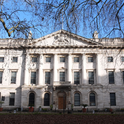Prime Minister Theresa May arrives at Cape Town airport on day one of her trip to South Africa, Nigeria and Kenya. Photo: PA
Before Brexit, the summer months were an opportunity for stories about hot weather and foreign romances. The prime minister went on holiday and planned popular initiatives for the autumn conference. Nobody in power actively planned how best to impoverish, isolate and humiliate the nation.
Well, that was then. Now we have a government determined to dominate each quiet news cycle with a fresh angle on how it intends to destroy itself and us.
The last eight weeks have represented a masterclass in how not to run a country. The government presented a proposal—the Chequers deal—which it knew would be despised by Leavers, Remainers and the EU. It lost Boris Johnson and David Davis, the clownish architect of Brexit and its incompetent manager. It ignored the Electoral Commission’s conclusion that the Leave campaign in 2016 had indulged in outright cheating.
Then it apparently cheated itself, by breaking a pairing agreement and lying about it. It allowed Parliament to harden the Chequers proposal even as it needed to soften it, and whipped MPs to require the UK to leave the customs union even though we will have to stay in it.
Theresa May gave a speech in Northern Ireland which effectively ruled out a withdrawal agreement. She then visited President Macron at his country retreat amid great fanfare and secured nothing, the day after EU negotiator Michel Barnier rejected Chequers on both its customs and single market proposals.
For the last few weeks, the government has talked up a no-deal scenario even though it has no intention of administering one—and the very talk of that leads businesses to activate contingency plans and markets to batter the pound.
A failure of national leadership
Each of these steps has embodied political regression and the failure of national leadership, and each has forced ministers deeper into a hole they will still have to climb out of.But the basic facts have not changed.We are still not leaving the EU with a hard Brexit, still less with no deal at all.
First, Chequers will fail. Indeed, its death has already been confirmed on both sides of the Channel. Leavers will not accept its level of integration, and Remainers will loathe our inability to shape or vote on key economic decisions. It offers the British people less control and less sovereignty than they had before.
The EU, for its part, is clear that it will not outsource its tax collection to the UK just so Northern Ireland can operate a different tariff regime, and will not permit the UK to accept the free movement of goods but not of services, capital or people. The proposal died before it drew its first breath.
That's not all
The Commons’ customs union amendment will also prove short-lived. In short: if we leave the customs union, we leave the EU with no deal.Northern Ireland must retain the possibility of staying in the customs union, otherwise there will be no open border on the island of Ireland, and no Irish ‘backstop’—which is the condition of any withdrawal agreement. And if the rest of the UK does not follow, goods will face a tariff border when they travel between Great Britain and Northern Ireland.
Which brings us to May’s recent Northern Ireland speech, in which she reiterated her opposition to differential UK economic arrangements on either side of the Irish Sea.
It is "something I will never accept," she said. But she did in fact accept it in the joint report of December 2017, whether she realised it at the time or not.
More to the point, she has little choice. She must either agree to a different status for Northern Ireland, or a velvet-soft Brexit for the whole UK in the single market and customs union.
The alternative to a comprehensive backstop is no-deal—which neither Parliament nor the people will accept. If May does not capitulate, she will simply have to resign.
The most lamentable spectacle
The talk of a no-deal scenario has been the most lamentable spectacle of all. The recent preparedness notices represented the climax of government negligence, incompetence and recklessness.A small majority of voters may have decided to "take back control," but not to lose their cancer treatment. The government knows that a no-deal scenario is impossible. It also knows that the narrative is spooking businesses and weakening the economy.
No matter. Like a patient with indigestion who insists on heart surgery, it continues the gruesome charade despite the palpable consequences.
Because the government is so determined to disguise stasis as progress, it is naturally also keen to project that onto the EU side. Barnier’s comments last week about the need for an ‘unprecedented deal’ with Britain were a case in point: many saw a breakthrough and the pound duly rose. But the facts remain the same in Brussels just as they do in London. Barnier said nothing new.
Straw-clutching, meet cherry-picking
The EU has always been prepared to offer the UK a strong deal if the British government does not seek to shaft Ireland or split the EU’s single market. Moreover, a deal encapsulating the single market and customs union would indeed be unprecedented for a third country.The EU has been saying this for 26 months but the UK still refuses to listen. The reality stays constant, and so do the problems. The only novelty is the addition of straw-clutching to Britain’s cherry-picking.
The summer was hot and the politics fevered, but Brexit has not significantly moved on from the situation last December. The UK government is still asking for differential tariffs on the island of Ireland, and still asking to split the EU’s single market while retaining the full integrity of its own.
The EU, meanwhile, is still not prepared to separate the four freedoms, and still rejects the UK’s proposed ‘customs partnership’ as roundly as it did when London first proposed it in August 2017.
This summer was as good as it got for the government. It will have to return to Parliament to ask it for a customs union. It will have to soften the Chequers offer. And it will have to make serious choices about the economic status of Northern Ireland and the free movement of people in the UK.
Ignore the heat and the noise. No-deal is still impossible. We are still heading for soft Brexit or no Brexit. And May is still toast. As she herself might say: nothing has changed.












